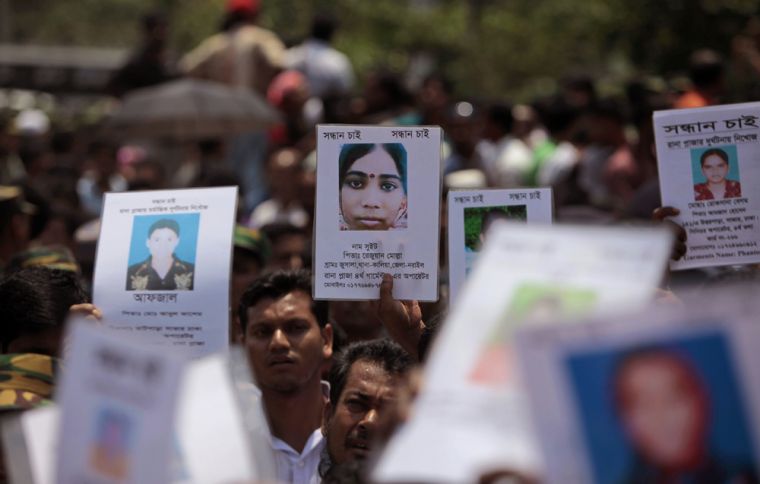'Silence is no longer an option' on plight of Bangladesh workers

An alliance of Churches recently gathered in Westminster to discuss how they could advocate for the rights of garment workers in Bangladesh.
The Methodist Church, Church of Scotland and Church of Bangladesh are campaigning for better rights for garment workers and greater global awareness following the collapse of the Rana Plaza building in Savar, where over 1,127 workers were killed.
The Very Reverend John Christie, former Moderator of the General Assembly of the Church of Scotland, has asked the public and British churches to become informed advocates for justice in Bangladesh.
Monika Hambrom, a Bangladeshi garment worker, was contacted during the conference via Skype.
She was working in the Rana Plaza the day the building collapsed in April. She explained how the workers had told the manager about the cracks in the building the previous day but they were still instructed to come in on the day of the collapse.
"I cannot sleep since the collapse of the building - it still comes to me in my dreams. I want to continue my work but in a safe place and for a just wage," she said.
Speaking at the conference, Mr Christie explained how he had been inspired by Welsh social campaigner Robert Owen's national campaign for a better society.
"What we do matches Robert Owen's vision," said Mr Christie.
In 2010, he visited Bangladesh and witnessed the conditions of the workplace. He described the situation as horrific and spoke of his desire to improve pay, facilities like restrooms, and "all that kind of stuff that is taken for granted here".
Despite the scale of the Rana Plaza collapse, Bishop Paul Sarker, Moderator of the Church of Bangladesh, said: "I think that we should thank God that most of the workers survived."
Since the tragedy, the Methodist Church and Church of Scotland have established a partnership with the Church in Bangladesh to work together for healing and justice.
Mr Christie continued, saying: "What happens here today is the beginning of better things. Today is, I believe, a key moment in Christian matters of health and safety with justice for the garment workers in Bangladesh. Silence is no longer an option."
A resource pack was shared at the event, offering a greater insight into the lives of Bangladesh garment workers.
This pack, which is already being used in Australia and the US, also included an action plan for campaigning, alongside a sample letter for consumers to send to their retailers, challenging the standards of workers.
The resource pack aims "to raise awareness and campaign for significantly improved workplace safety conditions, and pay for garment workers".
The coalition also wants to raise awareness using social media, such as Twitter.
"Today is an opportunity… it's a time to bring good news to the poor. It seems to me that this kind of advocacy is at the heart of the gospel," said Mr Christie.
The campaign has been launched ahead of the Christmas and winter sales, and it is hoped retailers and customers will think more about those involved in the manufacture of the products they are buying.
"This season, there will be no better time to prepare for Christmas, thinking about those who need our clothes, to respond to that challenge," said Mr Christie. "And like Robert Owen, 200 years ago, begin to offer to garment workers and those who work in Bangladesh, a new dimension of hope and love, expressed in the care and compassion which is a foundation of what we do here today."
Nick Debois MP said the UK Parliament was investigating the plight of Bangladeshi garment workers and that a group was due to fly out to Bangladesh this week. They plan to compile a final report by the end of October.
However, the Churches stressed that people should not boycott goods from Bangladesh but rather put pressure on retailers.
The Churches said boycotting the Bangladesh garment industry would not only affect the garment workers themselves, but also the families they support.
"The answer here is not to allow companies to leave the Bangladesh economy; that would be devastating," said Mr Debois.
Dr Daleep Mukarji, representing the Methodist Church in Britain said: "This campaign is not about not buying things from Bangladesh. That will not help the people of Bangladesh and the people we want to help. But we need that industry to be more fair and more just.
"I think that this can be the beginning, not just a movement, to give the people of Bangladesh, and the women of Bangladesh, a chance to face the future with dignity and pride. Education, money and power in the hands of women will lead to change."
He added that change would not come about without involving the owners of the garment industry in the discussion.
"We have to communicate with them. We have to involve them. We have to help them understand that their society, their families and their businesses will be better off if there is justice, inclusion and fairness.
"In my experience, I've always been told 'trade not aid'."











